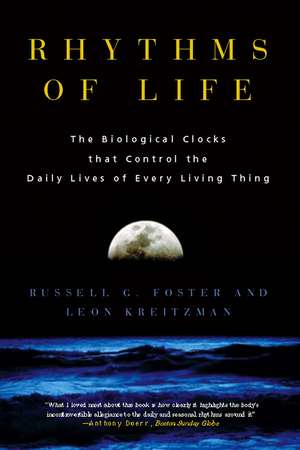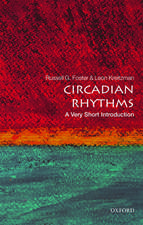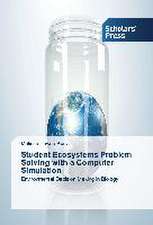Rhythms of Life: The Biological Clocks that Control the Daily Lives of Every Living Thing
Autor Russell Foster, Leon Kreitzmanen Limba Engleză Paperback – 10 oct 2005
An eye-opening discussion of how biological clocks affect the lives of all living organisms
Why can’t teenagers get out of bed in the morning? How do bees tell the time? Why do some plants open and close their flowers at the same time each day? Why do so many people suffer the misery of jet lag? In this fascinating book, Russell Foster and Leon Kreitzman explain the significance of the biological clock, showing how it has played an essential role in evolution and why it continues to play a vitally important role in all living organisms.
The authors tell us that biological clocks are embedded in our genes and reset at sunrise and sunset each day to link astronomical time with an organism’s internal time. They discuss how scientists are working out the clockwork mechanisms and what governs them, and they describe how organisms measure different intervals of time, how they are adapted to various cycles, and how light coordinates the time within to the external world. They review problems that can be caused by malfunctioning biological clocks—including jet lag, seasonal affective disorder, and depression. And they warn that although new drugs are being promoted to allow us to stay awake for longer periods, a 24/7 lifestyle can have a harmful impact on our health, both as individuals and as a society.
Why can’t teenagers get out of bed in the morning? How do bees tell the time? Why do some plants open and close their flowers at the same time each day? Why do so many people suffer the misery of jet lag? In this fascinating book, Russell Foster and Leon Kreitzman explain the significance of the biological clock, showing how it has played an essential role in evolution and why it continues to play a vitally important role in all living organisms.
The authors tell us that biological clocks are embedded in our genes and reset at sunrise and sunset each day to link astronomical time with an organism’s internal time. They discuss how scientists are working out the clockwork mechanisms and what governs them, and they describe how organisms measure different intervals of time, how they are adapted to various cycles, and how light coordinates the time within to the external world. They review problems that can be caused by malfunctioning biological clocks—including jet lag, seasonal affective disorder, and depression. And they warn that although new drugs are being promoted to allow us to stay awake for longer periods, a 24/7 lifestyle can have a harmful impact on our health, both as individuals and as a society.
Preț: 188.63 lei
Nou
Puncte Express: 283
Preț estimativ în valută:
36.10€ • 37.59$ • 30.51£
36.10€ • 37.59$ • 30.51£
Carte indisponibilă temporar
Doresc să fiu notificat când acest titlu va fi disponibil:
Se trimite...
Preluare comenzi: 021 569.72.76
Specificații
ISBN-13: 9780300109696
ISBN-10: 0300109695
Pagini: 288
Dimensiuni: 156 x 235 x 19 mm
Greutate: 0.27 kg
Editura: Yale University Press
Colecția Yale University Press
ISBN-10: 0300109695
Pagini: 288
Dimensiuni: 156 x 235 x 19 mm
Greutate: 0.27 kg
Editura: Yale University Press
Colecția Yale University Press
Notă biografică
Russell Foster is professor of molecular neuroscience at Imperial College, London, and is a leading expert on chronobiology. Leon Kreitzman, a writer and broadcaster, is the author of The 24 Hour Society.
Descriere
Descriere de la o altă ediție sau format:
Why are people who work anti-social shifts more illness prone and die younger? What is jet-lag and can anything help? Why do teenagers refuse to get up in the morning, and are the rest of us really 'larks' or 'owls'? Why are most people born (and die) between 3am-5am? This book answers these questions.
Why are people who work anti-social shifts more illness prone and die younger? What is jet-lag and can anything help? Why do teenagers refuse to get up in the morning, and are the rest of us really 'larks' or 'owls'? Why are most people born (and die) between 3am-5am? This book answers these questions.























